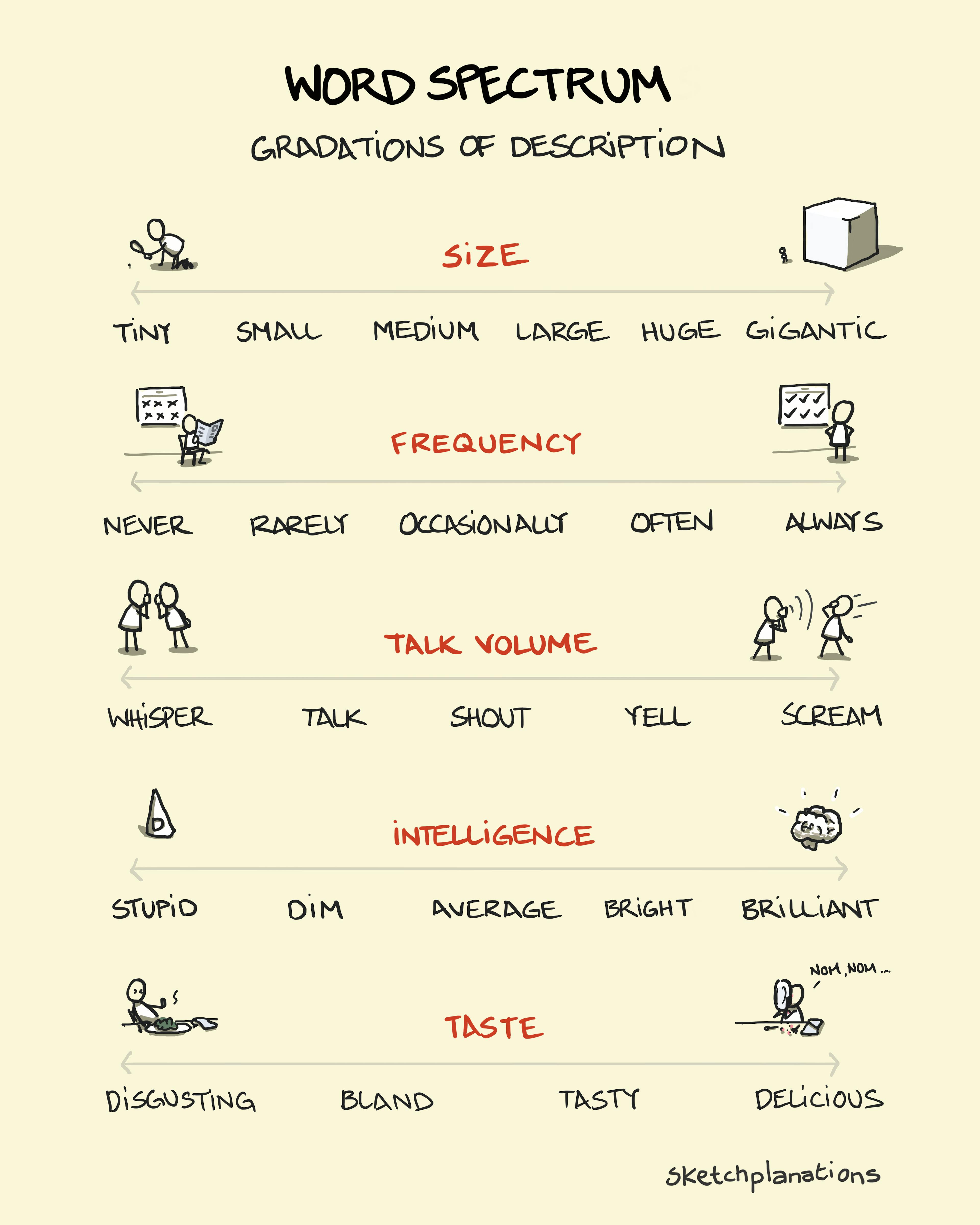Word spectrum

👇 Get new sketches each week
A word spectrum highlights different aspects of a concept from one extreme to another. By arranging words on a spectrum, we can see their subtle differences and nuances.
For example, a word spectrum of happiness might range from "Miserable" on one side to "Ecstatic" on the other, passing through "Gloomy", "Content", and "Happy" along the way.
Or a word spectrum of tiredness might be: Asleep - Drowsy - Groggy - Awake - Alert - Energised
It's not a science, and there's a fair amount of latitude for people to place different words in different positions. Looking at many spectrums, it strikes me that some writers excel at selecting specific and perhaps more intriguing words such as "scrumptious" or "mouth-watering" over the more common "delicious." Roald Dahl often had his characters "guzzle" instead of "eat hungrily," for example.
I became curious about word spectrums when I realised that my understanding of the spectrum of approval was different from that of many of my American friends. In British English, "quite" is often used to mean "a bit less than," but in the U.S., I found it was more commonly used to mean "a lot" or "very."
So, my British English word spectrum of approval would be:
OK - Quite good - Good - Excellent
While the word spectrum of approval for many of my U.S. friends might be:
OK - Good - Quite good - Excellent
It left me confused several times before I figured it out.
For other variations in interpretation, such as where you might put "awesome", there's an excellent table as a Guide for U.S. students interpreting feedback from faculty trained in the U.K. (and vice versa).
At times, it really matters what someone means with a descriptive word. In the "intelligence" trade "words of estimative probability " relate to specific odds meant by certain terms. For instance, if an attack is "highly likely," just how likely is it? If something is "almost certainly an airfield," how certain is that? Clearly, the choice and interpretation of these terms can be very significant. For a fascinating insight on this, see CIA analyst Sherman Kent's previously classified report Words of Estimative Probability (pdf). Other research has studied individual differences in people's perceptions of probability—and created some fun graphics showing the results.
Estimative probability is also critical in medicine. If exact numbers aren't shared, how frequent is a side effect that occurs "rarely"? Specific guides have been created listing associated probabilities for terms such as "likely", "frequent", "occasional" and "rare".
A reader also shared with me a classic chocolate advert of Fry's five boys , with the face of a boy moving from: desperation, pacification, expectation, acclamation and the realisation "it's Fry's".
More word spectrums, including those illustrated here:
- Size: tiny - small - medium - large - huge - gigantic
- Frequency: never - rarely - occasionally - sometimes - often - always
- Talk volume: whisper - murmur - talk - shout - yell - scream
- Intelligence: stupid - dim - average - bright - brilliant - genius
- Tastiness: disgusting - bland - tasty - delicious
- Smell: foul - stinky - scented - sweet
More fun scales and spectrums:
- Fahrenheit and Celsius
- The Bortle scale
- The fun scale
- Solar system scale
- The Scoville scale
- The square-cube law
- Do a 2x2

